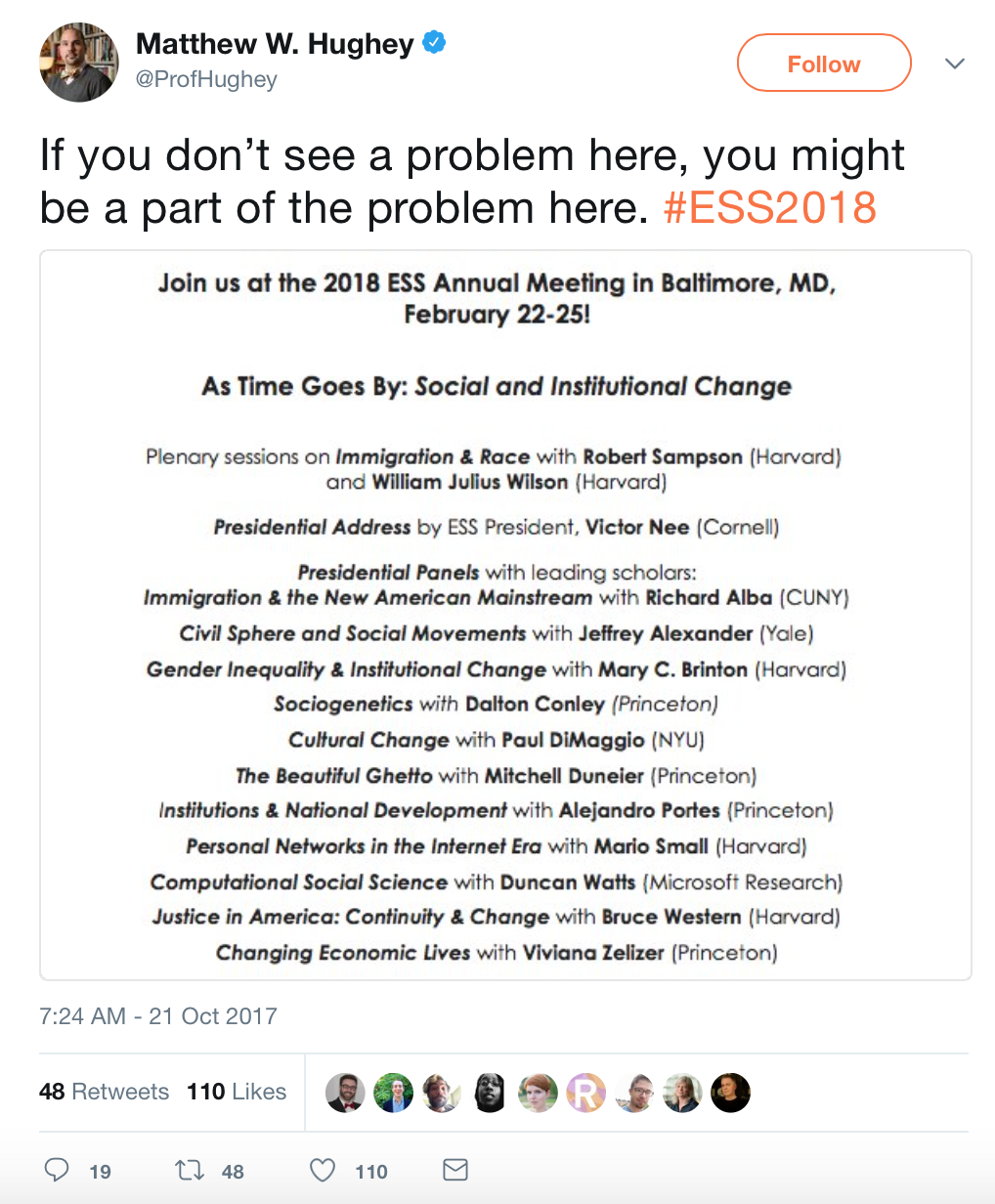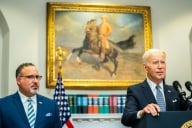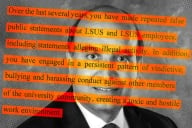You have /5 articles left.
Sign up for a free account or log in.
Sociologists study inequality for a living. The field is also relatively diverse. Panels at sociology conferences -- unlike some of their counterparts in traditionally male-dominated fields -- usually reflect both of those facts.
So a preliminary list of panels for the upcoming annual meeting of the Eastern Sociological Society that included two women among 14 academics total startled some earlier this week. It also led to a public debate about professional comportment and the purpose of scholarly meetings.
“If you don’t see a problem here, you might be a part of the problem here,” tweeted Matthew W. Hughey, an associate professor of sociology at the University of Connecticut, in response to the list on the Eastern Sociological Society’s home page. It listed plenary sessions by two male speakers, both from Harvard University; the society’s president, Victor Nee, the Frank and Rosa Rhodes Professors at Cornell University; and 11 presidential panels with “leading scholars.” Nine were men.

Hughey echoed thoughts others had already expressed on Facebook, though his tweet attracted posts from like-minded sociologists who said they were stunned by the apparent lack of diversity among panelists. Some said they planned to skip the meeting.
The home page was soon updated to include many more women as speakers within the panels listed. Among other changes, it included a lecture by Grace Kao, a professor of sociology at Yale University; the name of the society’s female vice president, Vilna Bashi Treitler, a professor of sociology at the University of California, Santa Barbara (formerly of the City University of New York’s Graduate Center and Baruch College); and a new panel proposal from Treitler, on “power and paradigm” in sociology.
Most of the female panelists included in the new list had previously agreed to speak at the conference, meaning they were not asked to appear merely as a result of the controversy. But Treitler said Tuesday that she had pitched her panel specifically in response to the first list.
“There’s a bigger issue here -- it’s not just about inclusion, it’s about hierarchy and power in the academy,” she said.
In the interim, Nee, the society's president, emailed Hughey -- copying the society's executive committee, of which Hughey is part -- to ask that he retract his criticism of the conference, according to an email obtained by Inside Higher Ed.
“I am writing to say that your recent Twitter violates norms of collegiality and academic values of the Eastern Sociological Society,” Nee wrote, saying that he’d promoted a recent talk by Hughey at Cornell. “As president of the [society], I request an apology and retraction of your Twitter post … [It] shows an uncollegial disposition, one that is in conflict with your responsibility” as a committee member.
Asked about the email Tuesday, Hughey said it was “inappropriate” request, "bullying and authoritarian in style," that could have a chilling effect on academics’ willingness to promote change from within their fields.
Richard Alba, a distinguished professor of sociology at CUNY's Graduate Center and past president of the society, also criticized Hughey via Twitter, saying that his “comment reveals sociology's widening cleavages.” In another tweet to Hughey, he wrote, “And I’m frankly surprised to see this announcement derided by a member of the [executive committee] -- you are one, right, Matthew?” (Note: An earlier version of this story incorrectly stated Alba's institutional affiliation.)
In another post that was criticized by a number of sociologists beyond Hughey, Alba defined a meeting as “a chance for junior colleagues to interact with luminaries. To me, there’s nothing out of the ordinary about advertising the meeting with big names.”
![Tweets from Tanya Golash-Boza (@tanyaboza) in response to Matthew Hughey and Richard Alba (@albamoore1): “One problem [with] this analysis is the assumption that ‘luminaries’ are only in the Ivies. There are plenty of people junior scholars would come out in droves to hear that are not white men at Harvard, Princeton or NYU.” From Alba: “How are all these white men at the Ivies? Brinton, Nee, Portes, Small, Wilson, Zelizer are not white men -- that's most. To be clear, there are critical scholars of color with major ESS roles -- such as Bashi Treitler and Bonilla Silva. Stop the rush to judgment.” Response from Vilna Bashi Treitler (@vtreitler): “Yes, I have an elected position (VP) in ESS, but I had almost no role in putting together the current program. [And] Bonilla Silva is not in ESS.” From Chinyere Osuji (@chinyereosuji): “Colorism, no women of color, classism, ageism, only two women. The issue is that there is nothing out of the ordinary. #ESS2018 is not for me.”](https://www.insidehighered.com/sites/default/server_files/media/Screen%20Shot%202017-10-24%20at%206.56.18%20PM.png)
Gender imbalances aside, Hughey told Inside Higher Ed, the full speaker list remains elitist, with 31 of 53 highlighted speakers coming from the Ivy League. While some may defend this as featuring the “best and brightest” speakers, he said, “I’d say the definition of ‘best and brightest’ is contested, and not shared.”
Treitler agreed, saying meetings, in her view, are a place for intellectual back-and-forth, not to idolize a very particular definition of senior scholars. “This is how scholarship is made.”
Via email, Nee said that the initial poster provided just a partial list of scholars who agreed to organize panels on the theme of social and institutional change.
Hughey “inferred incorrectly that the other panelists would be exactly like the organizers,” Nee said. Hoping to attract robust participation at the conference in Baltimore, he added, “I sought to recruit as panel organizers active and visible senior scholars in a broad range of fields of research with whom younger scholars might wish to interact. I am hopeful that the controversy will be resolved now that we have posted a more complete account of the 2018 presidential panels.”
Nee added, “The charges of lack of diversity in terms of institution, gender and ethnicity/race are just are not borne out by a fair-minded review of the panelists serving on the 2018 [society] plenary and presidential panels.” Some 40 to 50 percent of the panelists are women, while just over 30 percent are racial minorities, he said (Nee pointed out that he is the society's first Asian-American elected president). The Northeast, meanwhile, "has the greatest concentration of leading research universities of any region in the U.S. Not surprisingly, many panelists are from research universities. However, there is a representation of scholars from City University of New York and liberal arts colleges."
In an interview, Alba said the Eastern society has a particular reputation for diversity and inclusion in terms of race, gender and institution type; he served as its president when he was a professor at the State University of New York at Albany, for example, he added. So it’s puzzling, he said, that there’s so much “upset” over “a very skimpy statement of the program … It bothers me as a scholar to see people rush to judgment in this way.”
Nazli Kibria, chair of sociology at Boston University and the society’s president-elect, said she agreed to talk on a presidential panel months ago, forgot about it and was reminded when she saw her name on the updated list. While she understood her colleagues’ concerns about diversity and inclusion, she said, the Eastern society conference is a place where many sociologists present their first papers because it is so inclusive. She chalked the debate up to a “bureaucratic mishap.”
“I’m troubled that this whole discussion is not giving a true picture of what this organization is,” Kibria added. “Relatively speaking, compared to other groups, this is pretty inclusive.”









